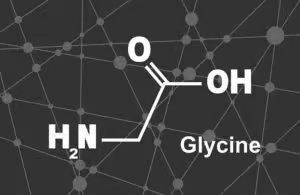Table of Contents
Glycine (2-Aminoacetic Acid, Gly, G) is a conditionally essential amino acid and neurotransmitter. The simplest of all amino acids, glycine plays a role in the synthesis of nucleic acids, glutathione, RNA and DNA, and creatine.[i]
Glycine is synthesized in your body from threonine (through threonine dehydrogenase pathway), choline (via formation of sarcosine), and serine (through serine hydroxy methyltransferase [SHMT]).[ii]
Glycine is considered a “conditionally essential” amino acid because your body cannot produce enough on its own. So, the remainder must be obtained from foods like meat, fish, dairy, legumes, or supplements.[iii]
Glycine plays a critical role as a neurotransmitter because it controls your intake of food, behavior, and complete body homeostasis.
It can be both excitatory and inhibitory. Which means that it can stimulate your brain and nervous system, as well as quieten it.
Supplementing with glycine has been shown to effective in treating metabolic disorders, inflammatory disease, obesity, cancers, and diabetes.
Here we’ll investigate as a nootropic for enhancing sleep quality and brain function.
Glycine helps:
- Sleep: Glycine helps you fall asleep more quickly, reduce insomnia, improve sleep quality, and promote deeper and more restful sleep
- Neurological disorders: Glycine has been shown to be effective in those dealing with schizophrenia, OCD, and depression.
- Stroke: Patients who have suffered ischemic stroke (brain ischemia or cerebral ischemia), are given glycine orally to help limit damage to the brain within the first six hours of the stroke.
What is Glycine?
Glycine (2-Aminoacetic Acid, Gly, G) is one of the most important amino acids in your body. It helps in regulation of cardiovascular, cognitive, and metabolic health.
 The name Glycine comes from the Greek word γλυκύς “sweet tasting“.
The name Glycine comes from the Greek word γλυκύς “sweet tasting“.
Glycine was discovered in 1829 by French chemist Henri Braconnot after boiling gelatin with sulphuric acid. And since then, it has been manufactured and distributed commercially as a sweetener, and as a buffering agent for antacids.
Glycine is also a sweet and colorless crystal that is synthesized in your body from choline, threonine, and serine.
As a therapeutic and nootropic supplement provides multiple benefits to human health.
Glycine has been shown to be effective for improving skin elasticity. And collagen peptide which is loaded with Glycine helps suppress sun-induced skin damage and reduce wrinkles around the eyes.[iv]
Glycine supplementation helps reduce the symptoms of schizophrenia.[v] It helps reduce symptoms of OCD. And low blood levels of glycine have been associated with depression.
Numerous studies have also shown glycine’s potential in improving sleep, enhancing memory, and increasing insulin sensitivity.
Glycine modulates inhibitory neurotransmitters via glycine receptors throughout the central nervous system.[vi] And potentiates NMDA receptors which provides an excitatory response.[vii] Affecting cognition, mood, immune function, and sleep.
How does Glycine work in the brain?
Glycine boosts brain health and function in several ways. But two in particular stand out.
- For sleep – Numerous studies have shown that glycine influences the quality of sleep, reduces insomnia, and promotes restful sleep. It does this in a couple of ways.
Glycine has a particular affinity for NMDA receptors and glycine receptors. Which results in increased peripheral blood flow, and a subsequent drop in the core body temperature.
In other words, glycine works to improve blood flow to the body’s extremities, which in turn reduces core body temperature.
This decrease in body temperature plays an important part of sleep induction since the onset of sleep is associated with lowered body temperature. Which then progresses to deep sleep.
Researchers demonstrated this in an animal study showing how glycine triggered a drop in body temperature which helped the study subjects fall asleep more quickly And spend more time in REM sleep. [viii]
The study also showed that glycine can help you experience deep, slow wave sleep more quickly.
Glycine has also been shown to increase the production of serotonin in the brain. Which helps sleep because serotonin aids in the synthesis of the sleep hormone melatonin.[ix]
Studies also suggest that glycine can help you get back to your regular sleep cycles after a period of a disrupted sleep schedule.[x]
- Schizophrenia – Glycine has shown promising results in reducing the symptoms of depression, OCD, anxiety, and bipolar disorder. However, its most pronounced efficacy is seen in the reduction of schizophrenia symptoms.
Post mortem evaluations of the brains of people with schizophrenia have shown fewer NMDA receptors compared to those who did not have the disease.
Researchers also found decreased levels of glycine in both the blood and cerebrospinal fluid of people with schizophrenia.[xi]
Glycine is known to be an NMDA agonist. It is well tolerated by the patients in both short-, and long-term treatment.
To date, numerous studies have been conducted to evaluate the efficacy of glycine in treating schizophrenia.
The first controlled trial used a glycine dose of 15 grams per day which showed significant improvement during glycine treatment.
Another study, 21 schizophrenic patients were given high doses of glycine in addition to antipsychotic treatment.
A significant 34% reduction in negative symptoms was observed during glycine treatment. And the study authors noted the improvement persisted even after patients stopped supplementing with glycine. [xii]
 How things go bad
How things go bad
Sleep deprivation or the inability to get a good night’s sleep is an increasing concern world-wide. Not enough sleep or poor sleep quality can result in:
↓ Memory loss
↓ Inability to concentrate
↓ Poor metabolism
↑ Weight gain
↑ Irritability
↑ High blood pressure
↑ High blood sugar levels
↓ Low sex drive
↑ Risk of heart disease
Glycine as a nootropic supplement helps the body make serotonin which improves sleep and mood. And it influences key receptors in the brain resulting in better learning and memory.[xiii] [xiv]
Low glycine levels in the body are also linked to depression.[xv]
 Glycine benefits
Glycine benefits
Glycine activates NMDA receptors in the brain and restores serotonin levels which helps improve sleep. And the ability to fall asleep faster.
In one study, 15 adult females were given either a placebo or 3 grams of glycine before bed.
The study concluded that supplementing with glycine showed a significant improvement in reduced fatigue, liveliness, and clear-headedness the next morning.[xvi]
Glycine helps brain cell signaling which boosts cognition, memory and mood.
Glycine taken in high doses has proven to be highly effective in reducing the symptoms of schizophrenia.
It helps with depression and mental fluency associated with schizophrenia.
And may improve psychotic symptoms as well.[xvii]
Evidence also suggests that glycine assists with depression and neurodegenerative diseases such as Alzheimer’s and Huntington’s.
Glycine also showed a protective effect against neurological damage associated with stroke.[xviii]
And research suggests improvements in memory, recall, and sustained attention in those supplementing with glycine as a nootropic.
How does Glycine feel?
People who take high quality glycine supplements report better sleep quality, and improved mood during the day.
Some users say they felt more balanced and livelier once they started supplementing with glycine.
Glycine is best taken 60 minutes before bed. Most users report a minimum of 7 hours of undisturbed, high quality sleep.
Glycine helps even chronic insomniacs fall asleep easily.
Unlike most sleep inducers, glycine does not leave you feeling groggy and fatigued in the morning. On the contrary, users wake up feeling rested and ready to tackle the day.
Glycine is a good joint health supplement. Because it aids in cartilage regeneration by enhancing collagen re-synthesis.
Glycine may also provide relief from night sweats for pre-menopausal and menopausal women.
 Glycine Clinical Research
Glycine Clinical Research
Glycine for schizophrenia
22 schizophrenic patients who were treatment-resistant took part in a double blind, placebo-controlled trial. They were administered 0.8g/kg per day of glycine along with their antipsychotic medication.
Clinical assessments were performed bi-weekly. The group who was administered glycine showed a 24-46% reduction in negative symptoms. [xix]
In another double-blind, placebo-controlled study, 14 medicated patients with chronic schizophrenia were treated with glycine. The results showed a significant improvement in negative symptoms in the group that was given glycine but not in the group given placebo. [xx]
Glycine for sleep
In a randomized placebo-controlled trial, 11 healthy adults were given either 3 grams of glycine or a placebo 1 hour before bed for 2 days. The results indicated quicker sleep onset followed by long, restful sleep.[xxi]
In 2012, another placebo-controlled study recruited healthy adults who were restricted to 25% less sleep than normal. Study subjects were given either a placebo or 3 grams of glycine before bed.
In subjects given glycine, the data showed a significant reduction in fatigue often related to reduced sleep.[xxii]
Glycine for learning and memory
Scientists studied the effects of bioglycin, a biologically active form of glycine in healthy students (mean age 20.7 years), and middle-aged men (mean age, 58.9 years).
The researchers specifically measured attention, memory, and mood using a double-blind, randomized design. [xxiii]
The results indicated that bioglycin significantly improved episodic memory in both the young and middle-aged group. And the middle-aged group also showed a significant improvement in the sustained-attention task.
Glycine Recommended Dosage
 Recommended nootropic dosage of Glycine is 3 grams per day.
Recommended nootropic dosage of Glycine is 3 grams per day.
Experts recommend a Glycine dosage of 0.4 grams per kilogram of body weight (g/kg) twice daily when taking an atypical antipsychotic like Zyprexa and Risperdal.
Many human trials have safely used glycine doses of 1 g (1000 mg) per day for supporting brain health after a stroke. And up to 50 grams per day for schizophrenia.
Most Glycine supplements come in 1000 mg capsules. And the most effective dose is reported to be 3 grams 60 minutes before bed.
Glycine Side Effects
Glycine supplements are generally considered non-toxic and safe with few side effects in most people.
However, supplementing with 9 grams or more of Glycine may result in mild gastrointestinal symptoms such as an upset stomach, nausea, loose stools, or vomiting.
Slight sedation is also a possible side effect of taking glycine.
Do not take glycine if you are on the antipsychotic drug Clozaril (clozapine). Unlike other drugs used to treat schizophrenia, glycine appears to decrease the effectiveness of Clozaril in some people.[xxiv]
Do not use glycine if you are suffering from diarrhea, as it may worsen the condition.
Due to lack of sufficient research, glycine should be avoided by breastfeeding and pregnant women unless prescribed by a physician.
Type of Glycine to Buy
Glycine is available in 1000 mg capsules, 500 mg tablets, and as powder.
Look for a Glycine supplement with zero “other ingredients”.
Avoid Glycine supplements containing additives such as silicon dioxide, stearic acid, or magnesium stearate.
I recommend: Click for Life Extension – Glycine because it is pure.
Nootropics Expert® Recommendation
I recommend Glycine as a nootropic supplement.
Your body makes some Glycine during the day. But you need more Glycine than your body can produce on its own. So, you must get it from food or a nootropic supplement.
Glycine is particularly effective in those dealing with sleep disorders or insomnia.
Supplementing with Glycine should provide a good night’s sleep. And have you feeling well-rested the next morning.
Glycine has been shown to be effective in those dealing with schizophrenia. Even while using most regular medications used with this disorder.
But please, if you are dealing with schizophrenia, check with your doctor before using this nootropic.
Glycine as a nootropic supplement used at recommended dosages is non-toxic and safe for most people with little or no side effects.
3 grams of Glycine seems to be most effective for most people taken about 60 minutes before bed.
I recommend: Click for Life Extension – Glycine because it is pure.








Join The Discussion - 152 comments
James
January 1, 2023
Hey Dave,
Wasn’t quite sure where would be best to ask about this since it doesn’t have a page of its own but figured I’d try here since it has “Glycine” in its name.
Just wondering what your thoughts were on Trimethylglycine (TMG, also known as Betaine Anhydrous) as a nootropic/supplement?
David Tomen
January 13, 2023
James, I am not aware of any human clinical studies showing Trimethylglycine (TMG) benefits for anything including any nootropic value.
James
December 19, 2022
Have seen a few people on Reddit forums recommend Gelatin for sleep quality, and it seems to be based on the Glycine aspect of Gelatin.
Just wondering what your thoughts were regarding using Gelatin or Gelatin powder as a Glycine source?
Thanks 🙂
David Tomen
December 21, 2022
James, Glycine is a conditionally essential amino acid and neurotransmitter meaning our body does not produce as much Glycine as it needs so we need to get it from food or a supplement. A Glycine supplement will provide you with the purest form of this amino acid. Not gelatin.
Israel
December 1, 2022
Hello from Brazil,
First, congrats for the website and the content, I´m a big fan of your work.
Thank you.
I´m taking escitalopram prescripted by a doctor, treating anxiety disorder.
Can you inform if I can take Glycine and NAC with escitalopram, do you know if these substances have negative interaction with escitalopram?
Thank you,
Best regards,
Israel Alvares
David Tomen
December 4, 2022
Israel, this is a list of the drugs and supplements contraindicated with escitalopram: https://www.drugs.com/drug-interactions/escitalopram-index.html. Avoid anything that is on that list.
Mick
November 29, 2022
Hi David,
I would like to ask you about Glycine for schizophrenia. In the post you mentioned that schizophrenic patients took part in trial and they were administered 0.8g/kg per day of Glycine.
Does it mean if a person is 100kg – 0.8g x 100kg = 80g of Glycine a day?
Would you recommend for someone with this condition to take such a high dose?
David Tomen
December 4, 2022
Mick, I do not recommend dosages of Glycine any higher than 3 grams per day. Higher dosages must be done under and doctor’s supervision as these studies were conducted under close supervision.
Emma
October 9, 2022
Hi David.
Happy Monday.
My iron supplement says iron bis glycinate 124mg equiv 24mg iron so does that mean it has 100mg of glycinate? Because I feel so much better mentally on these iron pills compared to any others in the past and wondering if it’s the glycinate ? I doubt it’s the iron because i even have infusions and don’t feel this much better mentally but like alll other supplements gives me horrendous nightmares even though I take it at 6:30am. Thanks
David Tomen
October 10, 2022
Emma, you are likely feeling the benefits of adequate iron because this form (Bisglycinate) is chelated which means it is the organic form of iron normally found in food. And as soon as your body “sees it” it gets used. Other forms are not ‘natural’ and it’s harder for your body to adjust and convert this mineral into a form it can use.
Emma
December 21, 2022
Amazing thanks David . Love your work. The dr always tells me I have to take ferrograd c and that this iron supplement won’t be enough so I might take it twice a day and see how that goes, or is that dangerous?
Wishing you a merry Christmas and happy new year .
Thanks again
David Tomen
December 21, 2022
Emma, it is never a good idea to go over the recommended dosage on any supplement. Including Iron. Your body takes a while to rebuild its iron stores and once you get there you need to maintain it with the current recommended dosage of that supplement. You will NOT get there twice as fast by doubling your daily dose. The human body doesn’t work that way.
emma
December 22, 2022
Hi David, interesting . Thank you . Oh oh . I double dosed the iron glycinate today. The ferrograd is 100 mg of elemental iron and the glycinate only 24 so since the Dr wants me on 100 with ferrograd I thought 50 can’t be that bad . I should’ve checked your reply earlier . I’m scared now.
Thanks
David Tomen
December 26, 2022
Emma, no reason to be scared. The human body has an amazing ability to heal itself given the right tools. And it is very forgiving of our stupidity too within reason.
Colby Smith
September 14, 2022
I have a friend struggling with Schizophrenia. Do you have any more information/an opinion on Sarcosine or D-Serine for Schizophrenia or just overall brain health? I know they have some similarities with Glycine which is why I posted here.
David Tomen
September 15, 2022
Colby, Sarcosine is an intermediate and byproduct in glycine synthesis. Both have been shown to be helpful in treating schizophrenia.
I suggest also taking a look at my research on NAC, L-Carnosine, CBD Oil, Sulforaphane, and Niacin.
Andy
August 24, 2022
Is 3Mg before bed a good knock out amount, I drink half glass mil before bed but then I’m up 3hours later for a pee and it takes me ages to get asleep again not sure what has more glycine a cup of milk or better off with a supplement and will NOW product be fine lots of extra crap in there i dont like but so does my melatonin i want to avoid relying on melatonin if you know a good clean product please do tell
David Tomen
August 24, 2022
Andy, 3 grams of Glycine about 60 minutes before bed seems to work for most people. Keep in mind Glycine seems to boost serotonin which go on to make melatonin. So, I do not suggest using any melatonin as a sleep supplement. If you insist on using Melatonin then no more than 1 mg.
But if you have trouble staying asleep I suggest revisiting your sleep stack and add some other supplements. Including; magnesium chelate 500 mg, L-Tryptophan 500 mg, PharmaGABA 250 mg, L-Theanine 300 mg, and if that doesn’t do it then add a couple of Charlotte’s Web Calm gummies. Let me know if you need links to any of those.
Eric
August 9, 2022
Hi David. Would you recommend taking both Glycine and magnesium glycinate?
David Tomen
August 10, 2022
Eric, both have their benefits and the reason you would use both is for that reason. Glycine is usually used at a much higher dose than what you would get from Magnesium Glycinate.